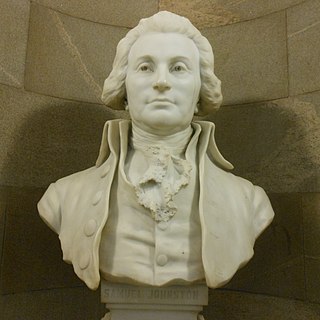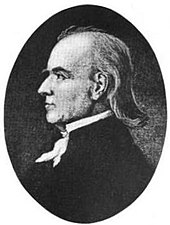
Joseph Hewes was an American Founding Father, a signer of the Continental Association and U.S. Declaration of Independence, and a native of Princeton, New Jersey, where he was born in 1730. Hewes's parents were members of the Society of Friends, commonly known as Quakers. Early biographies of Hewes falsely claim that his parents came from Connecticut. His mother, Providence Worth, and her parents were born in New Jersey. His father, Aaron Hewes was a 3rd generation resident of Chester County in Pennsylvania. Hewes may have attended the College of New Jersey, known today as Princeton University but there is no record of his attendance. He did, in all probability, attend the grammar school set up by the Stonybrook Quaker Meeting near Princeton.

William Blount was an American Founding Father, statesman, and land speculator who signed the United States Constitution. He was a member of the North Carolina delegation at the Constitutional Convention of 1787 and led the efforts for North Carolina to ratify the Constitution in 1789 at the Fayetteville Convention. He then served as the only governor of the Southwest Territory and played a leading role in helping the territory gain admission to the union as the state of Tennessee. He was selected as one of Tennessee's initial United States Senators in 1796, serving until he was expelled for treason in 1797.

Richard Caswell was an American politician and lawyer who served as the first and fifth governor of the state of North Carolina from 1776 to 1780 and from 1785 to 1787. He also served as a senior officer of militia in the Southern Theater of the American Revolutionary War. As a delegate to the First Continental Congress he was a signatory of the 1774 Continental Association.

The North Carolina State Treasurer is a statewide elected office in the U.S. state of North Carolina responsible for overseeing the financial operations of state government. The current state treasurer is Dale Folwell.

Samuel Johnston was an American planter, lawyer, and statesman from Chowan County, North Carolina. He represented North Carolina in both the Continental Congress and the United States Senate, and he was the sixth Governor of North Carolina.

The North Carolina General Assembly of 1777 met in two sessions in New Bern, North Carolina, from April 7 to May 9, 1777, and from November 15 to December 24, 1777. This was the first North Carolina legislature elected after the last provincial congress wrote the first North Carolina Constitution. This assembly elected Richard Caswell as the state's first constitutional governor.
The North Carolina General Assembly of 1778 met in three sessions in three locations in the years 1778 and 1779. The first session was held in New Bern from April 14 to May 2, 1778; the second session in Hillsborough, from August 8 to August 19, 1778; the third and final session in Halifax, from January 19 to February 13, 1779.
The North Carolina General Assembly of 1779 met in three sessions in three locations in the years 1779 and 1780. The first session was held in Smithfield from May 3 to May 15, 1779; the second session in Halifax, from October 18 to November 10, 1779; the third and final session in New Bern, from January to February, 1780.

John Baptist Ashe was a slave owner, U.S. Congressman, and Continental Army officer from Halifax, North Carolina.
The Hillsborough District Brigade of militia was an administrative division of the North Carolina militia established on May 4, 1776. Brigadier General Thomas Person was the first commander. Companies from the eight regiments of the brigade were engaged in 55 known battles and skirmishes in North Carolina, South Carolina, and Georgia during the American Revolutionary War. It was active until the end of the war.
The North Carolina Provincial Congresses were extra-legal unicameral legislative bodies formed in 1774 through 1776 by the people of the Province of North Carolina, independent of the British colonial government. There were five congresses. They met in the towns of New Bern, Hillsborough (3rd), and Halifax. The 4th conference approved the Halifax Resolves, a set of resolutions that empowered the state's delegates to the Second Continental Congress to concur in the Declaration of Independence from Great Britain. The 5th conference approved the Constitution of North Carolina and elected Richard Caswell as governor of the State of North Carolina. After the 5th conference, the new North Carolina General Assembly met in April 1777.

John Sitgreaves was a delegate to the Congress of the Confederation, a United States Attorney for the District of North Carolina and a United States district judge of the United States District Court for the District of North Carolina, the United States District Court for the Edenton, New Bern & Wilmington Districts of North Carolina and the United States District Court for the Albemarle, Cape Fear & Pamptico Districts of North Carolina.

John Mathews was a Founding Father of the United States and lawyer from Charleston, South Carolina. He was a delegate to the Continental Congress from 1778 to 1781 where he endorsed the Articles of Confederation on behalf of South Carolina. On his return, he was elected the 33rd governor of South Carolina, serving a single term in 1782 and 1783.
Thomas Eaton was a military officer in the North Carolina militia during the War of the Regulation in 1771 and American Revolutionary War from 1775 to 1784. He was a member of the North Carolina Provincial Congress and North Carolina House of Commons for several terms simultaneously with his military service. Eaton was a member of the North Carolina Council of State under Governor Richard Caswell. Eaton commanded soldiers in the battles of Brier Creek and Guilford Courthouse. At the time of the 1790 census, Eaton was one of the largest slaveholders in North Carolina.
The North Carolina General Assembly of 1780-1781 was the fourth elected legislative body of the State of North Carolina. The assembly consisted of a Senate and House of Commons that met in three sessions in at least two locations in the years 1780 and 1781. Each of the existing 50 North Carolina counties were authorized to elect one Senator and two members of the House of Commons. In addition, six districts also elected one House member each. The first two sessions were probably held in New Bern, North Carolina in April and September 1780. The third session met in Halifax from January 27, 1781 – February 13, 1781.
The North Carolina General Assembly of 1783 was the state legislature that convened in Hillsboro, North Carolina from April 18, 1783, to May 17, 1783. Members of the North Carolina Senate and the North Carolina House of Commons were elected by eligible North Carolina voters. This was the last assembly to meet during the American Revolution. Much of their time was devoted to taking care of the North Carolina soldiers that fought in the war.

The Fifth North Carolina Provincial Congress was the last of five extra-legal unicameral bodies that met beginning in the summer of 1774. They were modeled after the colonial lower house. These congresses created a government structure, issued bills of credit to pay for the movement, organized an army for defense, wrote a constitution and bill of rights that established the state of North Carolina, and elected their first acting governor in the fifth congress that met in 1776. These congresses paved the way for the first meeting of the North Carolina General Assembly on April 7, 1777 in New Bern, North Carolina. The Fifth Congress met in Halifax from November 12 to December 23, 1776. Richard Caswell served as president, with Cornelius Harnett as vice-president.
The North Carolina General Assembly of April to June 1784 met in New Bern from April 19 to June 3, 1784. The assembly consisted of the 120 members of the North Carolina House of Commons and 50 senators of North Carolina Senate elected by the voters in April 1784. As prescribed by the 1776 Constitution of North Carolina, the General Assembly elected Alexander Martin to continue as Governor of North Carolina. In addition, the assembly elected members of the Council of State.
The North Carolina General Assembly of 1785 met in New Bern from November 18, 1785 to December 29, 1785. The assembly consisted of the 114 members of the North Carolina House of Commons and 54 senators of North Carolina Senate elected by the voters on August 19, 1785. During the 1785 session, the legislature created Rockingham County. As prescribed by the 1776 Constitution of North Carolina the General Assembly elected Richard Caswell to continue as Governor of North Carolina and members of the Council of State.
The North Carolina General Assembly of 1862–1864 met in Raleigh from November 17, 1862 to December 22, 1862. Extra sessions were held on January 19, 1863–February 12, 1863; June 30, 1863–July 7, 1863; November 23, 1863–December 14, 1863; and May 17–30 1864. The assembly consisted of the 120 members of the North Carolina House of Commons from 82 counties and 50 senators representing one or more counties in North Carolina Senate elected by the voters in October 1862. Zebulon Baird Vance was Governor of North Carolina during this assembly. This assembly met during the American Civil War as part of the Confederate States of America. Much of the legislation passed by this assembly dealt with the managing the state and its population during wartime.

















